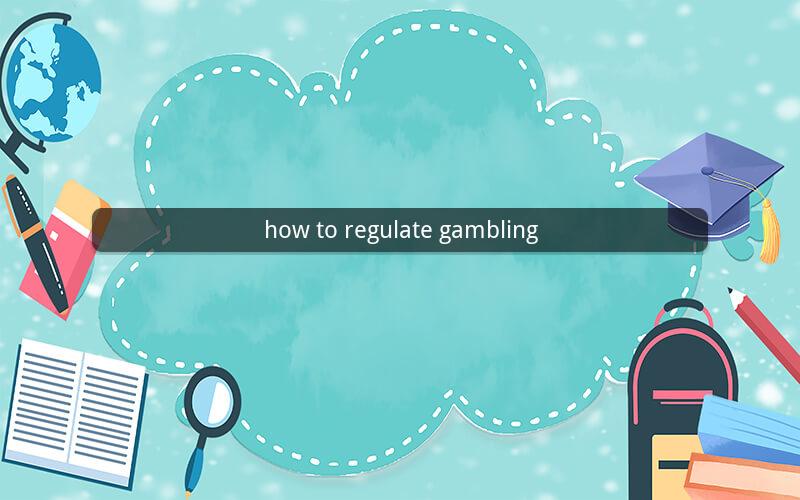
How to Regulate Gambling: A Comprehensive Guide
Table of Contents
1. Introduction to Gambling Regulation
2. The Importance of Gambling Regulation
3. Legal Framework for Gambling Regulation
4. Licensing and Regulation Bodies
5. Responsible Gambling Initiatives
6. Age Verification and Restrictions
7. Problem Gambling and Support Services
8. Advertising and Marketing Regulations
9. Online Gambling Regulation
10. The Future of Gambling Regulation
1. Introduction to Gambling Regulation
Gambling regulation is a complex and multifaceted area that involves the establishment of laws, policies, and guidelines to ensure the fair, safe, and responsible operation of gambling activities. It encompasses various aspects, including licensing, taxation, advertising, and the protection of vulnerable individuals.
2. The Importance of Gambling Regulation
Regulating gambling is crucial for several reasons. It helps prevent fraud, protects consumers from unscrupulous operators, and ensures that gambling activities contribute positively to the economy. Moreover, effective regulation can help mitigate the negative impacts of gambling, such as addiction and financial hardship.
3. Legal Framework for Gambling Regulation
The legal framework for gambling regulation varies significantly from one country to another. In some jurisdictions, gambling is legal and well-regulated, while in others, it is either illegal or heavily restricted. The framework typically includes laws on licensing, taxation, and the establishment of regulatory bodies.
4. Licensing and Regulation Bodies
Licensing is a key component of gambling regulation. Operators must obtain a license to conduct gambling activities, which is issued by a regulatory body. These bodies are responsible for overseeing the gambling industry, ensuring compliance with regulations, and investigating complaints.
5. Responsible Gambling Initiatives
Responsible gambling is a core principle of effective regulation. Initiatives include setting deposit limits, providing self-exclusion services, and promoting awareness of the risks associated with gambling. Operators are encouraged to implement measures that protect vulnerable individuals and promote a healthy gambling culture.
6. Age Verification and Restrictions
Age verification is essential to prevent underage gambling. Operators must implement robust systems to verify the age of their customers and restrict access to minors. This includes the use of age verification software and the implementation of age-restricted areas or websites.
7. Problem Gambling and Support Services
Problem gambling is a significant concern, and regulation should aim to address this issue. Operators are required to provide information on support services and promote responsible gambling. In some cases, regulatory bodies may require operators to fund research and treatment programs for problem gamblers.
8. Advertising and Marketing Regulations
Advertising and marketing play a crucial role in shaping public perception of gambling. Regulations should limit the scope and content of gambling advertisements, ensuring they are not misleading or offensive. Operators must also provide clear information about the risks associated with gambling.
9. Online Gambling Regulation
Online gambling presents unique challenges due to its borderless nature. Regulation should address issues such as cross-border gambling, data protection, and consumer protection. Operators must comply with the regulations of the jurisdictions in which they operate and ensure that their websites are accessible to customers in those jurisdictions.
10. The Future of Gambling Regulation
The future of gambling regulation is likely to be shaped by technological advancements, changing societal attitudes, and the increasing popularity of online gambling. It is essential for regulatory bodies to adapt and evolve to address these challenges and ensure the continued integrity of the gambling industry.
---
10 Questions and Answers
Question 1: What is the primary goal of gambling regulation?
Answer: The primary goal of gambling regulation is to ensure the fair, safe, and responsible operation of gambling activities, while mitigating the negative impacts of gambling on individuals and society.
Question 2: How does licensing contribute to gambling regulation?
Answer: Licensing ensures that only operators meeting certain criteria are allowed to conduct gambling activities. It helps maintain the integrity of the industry and protects consumers from unscrupulous operators.
Question 3: What are responsible gambling initiatives?
Answer: Responsible gambling initiatives are measures aimed at protecting vulnerable individuals and promoting a healthy gambling culture. They include setting deposit limits, providing self-exclusion services, and promoting awareness of the risks associated with gambling.
Question 4: Why is age verification important in gambling regulation?
Answer: Age verification is important to prevent underage gambling, which can have serious consequences for minors and their families. It ensures that only individuals of legal age can access gambling services.
Question 5: How can problem gambling be addressed through regulation?
Answer: Problem gambling can be addressed through regulation by requiring operators to provide information on support services, fund research and treatment programs, and implement measures that protect vulnerable individuals.
Question 6: What challenges does online gambling present for regulation?
Answer: Online gambling presents challenges such as cross-border gambling, data protection, and consumer protection. Regulation must adapt to address these issues to ensure the integrity of the industry.
Question 7: How can advertising and marketing be regulated in the gambling industry?
Answer: Advertising and marketing can be regulated by limiting their scope and content, ensuring they are not misleading or offensive, and requiring operators to provide clear information about the risks associated with gambling.
Question 8: What role do regulatory bodies play in gambling regulation?
Answer: Regulatory bodies are responsible for overseeing the gambling industry, ensuring compliance with regulations, investigating complaints, and issuing licenses to operators.
Question 9: How can gambling regulation evolve with technological advancements?
Answer: Gambling regulation can evolve by adapting to new technologies, such as blockchain and artificial intelligence, to enhance consumer protection and improve the efficiency of regulatory processes.
Question 10: What is the future of gambling regulation in light of changing societal attitudes?
Answer: The future of gambling regulation will likely involve a greater focus on consumer protection, responsible gambling, and the integration of technology to address the challenges posed by the evolving gambling landscape.